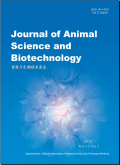首页|期刊导航|Journal of Animal Science and Biotechnology|Oleanolic acid improved intestinal immune function by activating and potentiating bile acids receptor signaling in E. coli-challenged piglets
Oleanolic acid improved intestinal immune function by activating and potentiating bile acids receptor signaling in E. coli-challenged piglets
Chenyu Xue Hongpeng Jia Rujing Cao Wenjie Cai Weichen Hong Jianing Tu Songtao Wang Qianzhi Jiang Chongpeng Bi Anshan Shan Na Dong
Journal of Animal Science and Biotechnology2024,Vol.15Issue(5):P.2137-2155,19.
Journal of Animal Science and Biotechnology2024,Vol.15Issue(5):P.2137-2155,19.DOI:10.1186/s40104-024-01037-0
Oleanolic acid improved intestinal immune function by activating and potentiating bile acids receptor signaling in E. coli-challenged piglets
摘要
关键词
Bile acid receptors/Enterotoxigenic Escherichia coli/Intestinal innate immunity/Oleanolic acid分类
农业科技引用本文复制引用
Chenyu Xue,Hongpeng Jia,Rujing Cao,Wenjie Cai,Weichen Hong,Jianing Tu,Songtao Wang,Qianzhi Jiang,Chongpeng Bi,Anshan Shan,Na Dong..Oleanolic acid improved intestinal immune function by activating and potentiating bile acids receptor signaling in E. coli-challenged piglets[J].Journal of Animal Science and Biotechnology,2024,15(5):P.2137-2155,19.基金项目
financially supported by the National Natural Science Foundation of China(Grant No.31972580 and U21A20252) (Grant No.31972580 and U21A20252)
the China Agriculture Research System(CARS-35) (CARS-35)
the Science Fund for Distinguished Young Scholars of Heilongjiang Province(JQ2022C002) (JQ2022C002)
the Support Project of Young Leading Talents of Northeast Agricultural University(NEAU2023QNLJ-017) (NEAU2023QNLJ-017)
。 ()

